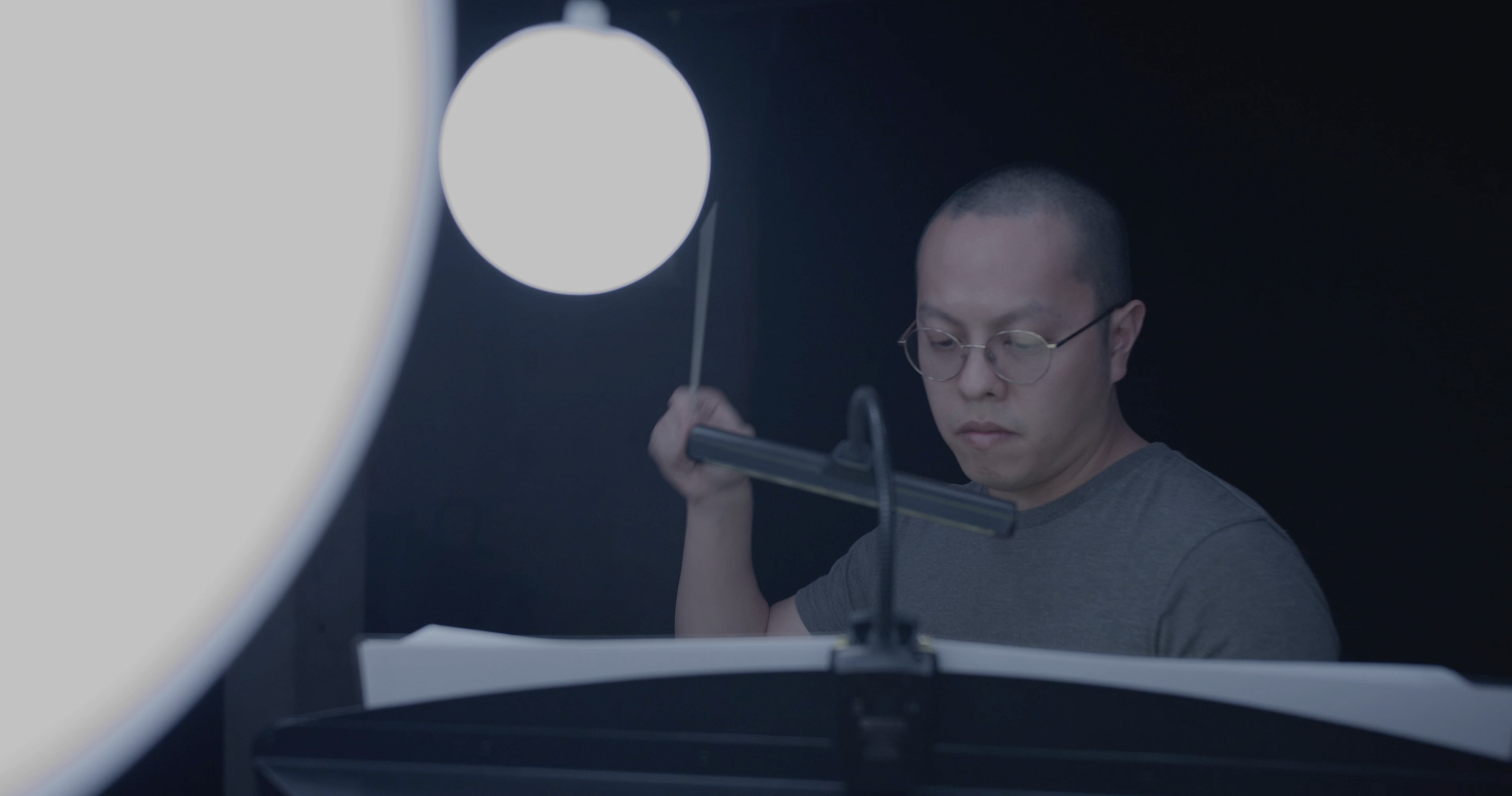Songs Across Borders: Austin Oting Har’s Journey Through Music and Writing
October 15, 2025
- Musician and writer Austin Har has lived and worked across countries, traditions, and genres, each move reshaping his creative voice
- The physical landscapes around him, and the personal chapters within them, leave traces in his art and stories
- “Movement has taught me that creativity is never fixed—it’s always in conversation with where you are and who you are becoming.”

Har conducting while reading sheet music under the Mind at Work light sculpture at Casula Powerhouse Arts Centre. Photo by Leon Norting Har
By Jess Watley ’27, RCAH Senior Communications Intern
Austin Har thrives in every environment he steps into—geographically or artistically. A composer, writer, and educator, he has lived and worked across continents, carrying pieces of each landscape into his music. His works, described as “blinding, dazzling” by the Sydney Arts Guide, weave together the digital and the ancient: Greek tragedy and Japanese noh theatre sit alongside experimental electronics and algorithmic coding.
For Har, place is never just backdrop. The islands of the Caribbean, where he once taught and performed, find their way into his rhythms. The philosophies he studied in Scotland press against the silences between notes.
“Movement has taught me that creativity is never fixed,” said Har, who joined the faculty of the Residential College in the Arts and Humanities (RCAH) at Michigan State University this fall as an assistant professor. “It’s always in conversation with where you are and who you are becoming.”
This fall, Har joins RCAH with a slate of creative initiatives that reflect his global sensibility and collaborative spirit. In RCAH 215: Introduction to Songwriting and Music Production, students explore songwriting and music production as deeply interconnected practices. Blending hands-on learning with cultural and historical perspectives.
One of Har’s most exciting projects is the launch of Bogue Street Records, a new record label created in collaboration with RCAH students in his 215 course, as well as faculty and staff. Named for the road that borders the RCAH building, the label will feature an eclectic mix of musical genres, spoken word and poetry, and sonic art. “A record label is interdisciplinary and collaborative by nature—like RCAH’s students—so I’m excited to engage with students with interests not just in music production, but also across these other areas (photography, graphic design, video, web design, etc) that are essential to a healthy label.” Har expounded.
“Austin is a wonderful addition to the RCAH community, and we are so fortunate to welcome him to MSU this fall,” said RCAH Interim Dean Glenn Chambers. “A composer of renown and a critically acclaimed musician, Austin’s talents and enthusiasm are already enhancing our student experience here in RCAH. I look forward to seeing—and hearing—his accomplishments in the future.”
In a recent interview, Har said that eclecticism and in-betweenness—between worlds, genres, and traditions—is where he is most at home. He described his compositions as likely to feature ancient instruments, as they are custom digital soundscapes. He is drawn to phonaesthetics, the music of words themselves, which shapes not only his poetry but his translations.
“The sound of language matters as much as its meaning,” he noted, echoing his belief that music and text share the same roots.
Language, said Har, is more than a vehicle for communication—it’s an instrument in itself. In his research and compositional work, he collaborates with poets and linguists, experimenting with phonaesthetics to push text into the realm of performance. His range is vast—"in one piece, Mountain Witch, repetitions and shifts between whispered and sung words echo like a musical motif; in another, Renga for White Noise, the collaborative call-and-response structure of medieval Japanese linked-verse poetry is transmediated into improvisatory electronic music between human and AI collaborators, not fixed renderings, but alive with the rhythm and musicality of syllables."
“Sometimes, a sound or syllable strikes with such intensity that it becomes a signature in my work.” On his website, he highlights invented words that he created with linguists for his Greek tragedy-inspired opera, like "Vorokh" and "Vikhtávon tavá", that carry both musicality and meaning in their integration of guttural and exhortatory sounds from languages such as Hebrew, Arabic, and German, as well as letters that are not found in the ancient Greek language."
Har’s career has stretched from orchestra pits for musical theatre to international festivals like Berlin Atonal and Dark Mofo. He has been commissioned, published, broadcast, and awarded across the U.S., Europe, Australia, and Japan. Yet in each new city: Sydney, San Francisco, Charlotte Amalie, he finds continuity in collaboration, often working with poets, linguists, designers, and cultural bearers to fold other perspectives into his practice.
This fall, as Har brings that global sensibility to RCAH, it is another crossing, another dialogue. Har’s work itself is like a tether to creativity: flexible and enduring, connecting experiences across geographies, one composed again and again in the act of listening.
“If composing were like tennis, I’d say it’s the individuality of the game,” Har opined. "Finding your own style, embracing your uniqueness, advancing the principles of excellence and adaptability that are inherent to virtuosity, and making them work together is how I’ve worked to create authentically."
“Every shift brings a new rhythm,” he says. “You just have to listen for it.”
Learn more from Austin’s Website!
Personal Bio- RCAH Website
If you’re curious about how movement, place, and identity can shape creativity, Har encourages you to lean into transitions rather than fear them.
Austin Har is a composer, writer, and educator whose work spans continents and traditions. With a background in composition, music technology, and ancient philosophy, he continues to explore how sound and story connect across cultures.

